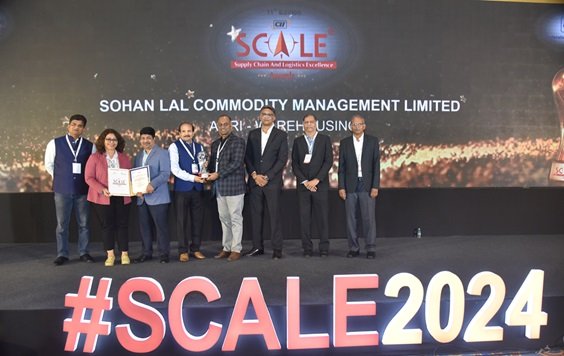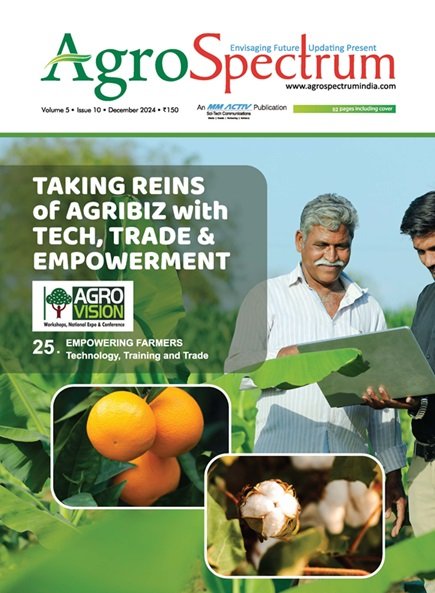Dr M Ramasami, Founder & Chairman, Rasi Seeds (P) Ltd shared his views on genetically modified (GM) and hybrid seeds for sustainable production of cotton in India.
Rasi Seeds is a leading company which specialises in producing quality hybrid seeds. The company’s team with advanced genetic engineering and breeding technologies create seeds of required attributes along with in-built biotic and abiotic stress resistance that suit varying agro-climatic conditions. In an interaction with AgroSpectrum, Dr M Ramasami, Founder & Chairman of Rasi Seeds (P) Ltd shared his views on genetically modified (GM) and hybrid seeds for sustainable production of cotton in India. Edited excerpts:
How is Rasi Seeds contributing to reviving self-sufficiency in cotton production?
We are reviving self-sufficiency in cotton production in India by improving genetics by providing high-yielding, pest-resistant and high-density planting system (HDPS) cotton hybrids with improved agronomic parameters tailored to diverse agro-climatic zones. The company’s commitment to innovation has led to the development of bollworm-resistant Bt cotton hybrids, which significantly reduces crop losses and pesticide dependency, thus promoting sustainable cotton farming. With a strong focus on quality, we ensure genetic purity in its seed production and processing, ensuring consistent and reliable yields for farmers.
Additionally, its “farmers-first” approach includes offering timely support, guidance, and training programmes to enhance farmers’ skills in pest management, water conservation, and soil health. These comprehensive efforts not only boost productivity but also strengthen the local supply chain, helping India to attain self-sufficiency in cotton and supporting rural economic stability.
What inputs are required for the growth of the cotton farming industry in India?
India’s cotton farming industry struggles with issues like pest infestations (notably pink bollworm and CLCuV), soil degradation, water scarcity, and outdated agronomic practices, all of which hinder productivity and economic stability for farmers. Addressing these issues requires key inputs: pest-resistant and climate-resilient varieties/hybrids, such as genetically modified (GM) and hybrid seeds tailored to Indian conditions, can significantly improve yields and reduce losses. Sustainable soil management practices, including balanced fertilisation and crop rotation, are essential to maintain soil health. Efficient irrigation techniques, like drip irrigation, help to manage water resources effectively in the regions facing water scarcity.
Supportive government policies offering subsidies and affordable credit, along with farmer education programmes, empower farmers with knowledge of best practices and market insights. Additionally, adopting precision farming technologies and digital tools can further enhance productivity and resilience in the cotton sector, driving India as a global leader in cotton production.
However, regulatory hurdles, such as lengthy approval processes and complex compliance requirements for GM cotton, often hinder the adoption of these technologies. Streamlining the regulatory framework with clear, science-based guidelines, expedited approvals, and increased transparency could accelerate access to innovative genetically engineered seeds, ultimately strengthening the cotton industry and supporting India’s agricultural economy.
Rasi Seeds is working on the application of Gene-editing technology for Rice, Cotton and Mustard for increasing yield and other economically important traits. Can you elaborate more on this?
We are currently in the exploratory phase, concentrating on building capacity in gene-editing technology. We plan to initiate projects once the licensing issues are resolved. While genome editing technology is freely available to academic institutions for research and development purposes, its licensing for commercial use poses significant challenges. Government support and subsidies for accessing this technology through centralised platforms could facilitate broader adoption and innovation in the industry.
The lack of a clear IP policy for seeds acts as a deterrent to R&D investment by the seed industry. Formulating a comprehensive seed strategy, including clear guidelines on patents and the Plant Variety Protection Act (PVPA), is essential to encourage investment and innovation in genome editing technologies.
Recently the Supreme Court said that the government should conduct a national consultation, preferably within the next four months, to formulate a National Policy on GM crops. Considering this, what preparations are required for the adoption and commercialisation of the seeds developed using GM technology in India?
With nearly three decades of a well-developed regulatory system, there is considerable experience in both approving and rejecting various events based on established criteria. For smoother and effective implementation, streamlining these existing guidelines with transparent, science-based protocols would help address both safety and efficiency. Enhanced collaboration between regulatory bodies and agricultural scientists is essential to build a thorough, consistent framework for GM crop approval. Additionally, raising awareness and conducting capacity-building programmes can prepare farmers for the responsible adoption of GM technology while minimising environmental risks and aligning with the regulatory standards in place.
Rasi Seeds has collaborated with the Central Institute of Cotton Research (CICR) and Tamil Nadu Agriculture University (TNAU) to drive research projects on cotton crop improvement. How will it benefit in developing new seed varieties?
Our collaboration with CICR is on the “Development of CLCuD-resistant Gossypium hirsutum genotypes” using elite exotic germplasm resources and their cross derivatives. Additionally, CICR and Rasi will conduct season-long monitoring and management of pink bollworm in cotton crops in the northern zone and study the dynamics of the bollrot disease complex in upland cotton across India. Rasi Seeds has also signed an MoU with TNAU for genomic selection in cotton, aimed at accelerating genetic improvements in fibre yield and quality.
By partnering with these esteemed research institutions, Rasi Seeds gains access to cutting-edge research, extensive genetic resources, and expert insights into cotton breeding and genetics, which accelerates the development of pest-resistant, high-yielding, and climate-resilient cotton varieties. This collaboration allows Rasi Seeds to integrate advanced traits, such as resistance to CLCuV, Pink bollworm and tolerance to drought, into its seed lines with precision and efficiency, offering superior performance to meet the challenges faced by Indian cotton farmers.
To read more click: https://agrospectrumindia.com/e-magazine
Dr M Ramasami, Founder & Chairman, Rasi














